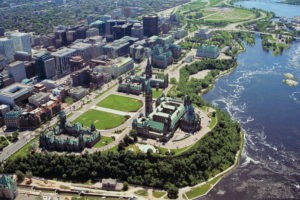Put Frozen Russian Assets ‘to Work’ as Reparations, Says Former Foreign Minister Axworthy, Urging Canada to ‘Lead the World’
This excerpt from The Hill Times discusses Bill S-217, the Frozen Assets Repurposing Act, which is sponsored by Senator Omidvar.

Canada can “lead the world” and “up its game” applying pressure on Russian President Vladimir Putin’s inner circle by distributing seized wealth to Ukrainian victims, says Canada’s former top diplomat Lloyd Axworthy.
Russian oligarchs who have benefited from Putin’s reign have major investments in Canada, which Axworthy said has been a strong part of the “economic squeeze” to dissuade Putin.
Western leaders have faced criticism that sanctions so far have not had the desired effect, with Russia undeterred and ramping up its military efforts targeting civilians and bombarding cities since the invasion of Ukraine began more than a week ago.
There’s a second, key step that needs to happen that would make a “strong, incremental difference,” suggested Axworthy, who served as Canada’s foreign minister from 1996 to 2000 under Liberal prime minister Jean Chrétien.
“Make them pay reparations back into Ukraine for the damage that’s being done,” using the assets that have been frozen already, said Axworthy, speaking during a March 3 panel organized by The Pearson Centre.
The UN High Commissioner for Refugees has estimated that the war has forced more than one million people to cross Ukraine’s borders in one week.
Billions of assets in Canada are going to be frozen, said Axworthy. “Rather than having them stay moldy, let’s put them to work for the people who are really paying the price of their efforts.”
Axworthy first pushed for this approach just days after the first Russian strikes on Feb. 24, penning an op-ed in The Globe and Mail with Independent Senator Ratna Omidvar (Ontario) and Fen Osler Hampson, an international affairs professor at Carleton University.
“Presented with few options, Western countries must get creative and find ways to hit Mr. Putin where it really hurts. Mr. Putin’s power and personal wealth, conservatively estimated to be roughly $250-billion with much of it hidden in shell companies and offshore accounts, rests on the complicity of a small group of financial oligarchs who themselves have become billionaires with his backing and political support,” they wrote.
They argued Omidvar’s public bill S-217, the Frozen Assets Repurposing Act which was adopted at second reading by the Senate on March 1, would give the government the tools to use the tactic, and make apparent to Putin’s cronies they can feel “much more pain” and be separated permanently from their “fortunes, their private yachts and their palatial homes abroad.”
That bill, or a comparable one, could pass the House of Commons within two weeks, and Canada would “lead the world,” Axworthy told the Pearson audience. The House is on two break weeks and not scheduled to sit again until March 21.